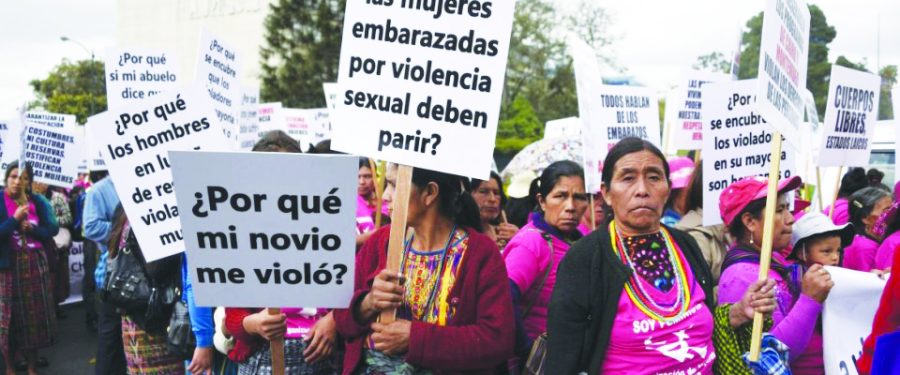Women demand more security and protection in Mexico
The fight against gender-based violence
Women are asking the government to take action and proceed to fight for the victims that were involved in femicide cases
Women demand support from the Mexican government to support them so that justice is done for the thousands of missing girls and women. They wanted more security and more safety. Following the national holiday Day of the Dead, people related to the femicide victims protested in Mexico City carrying signs as they chanted “We are your voice.”
A larger purple banner was displayed proclaiming “Voices of the Absence” throughout the march. About 500 people participated in the protest. The protestors marched along the emblematic Paseo de la Reforma avenue. The color purple has been associated with domestic abuse and violence against women symbolizing survivors who continue to fight despite the limited circumstances given.
On Nov. 3 , the day after Day of the Dead celebrations ended, demonstrators had marched throughout Mexico city claiming the day is named after Day of the Dead women. The intent is to raise awareness of Mexico’s constantly growing femicide problem and to end violence against women.
Frida Guerrera, a journalist and activist who leads “Voices of Absences” organized the group to focus on demanding justice for women who are killed because of their gender. Each person carried a graveyard cross, each one represented a case, a pain.
The women of Mexico want the authorities to take action and to act upon one another to seek justice and truth for each of the victims. The demand is to urge the government to listen to their citizens, their opinions and their truths to make Mexico a safe place for everyone.
They are begging for the government to arrest people who are at large and for justice to be done. If they aren’t going to bring the dead back, they can at least give peace and tranquillity. Defined from the World Health Organization, the intentional murder of women are because they are women.
Crimes against women were under- reported and not investigated enough.Revealed in October, 762 women were murdered between January and September of this year, a 5 percent rise from the same period in 2020.
According to the United Nations, femicide in Latin America kills 12 women on a daily basis. 98 percent of the cases involving women go unprosecuted across Latin America. The violence against women has rendered 56 percent of the countrys territory as unsafe for women.
Human rights group Amnesty International says investigations of cases involving women are often flawed because the evidence is no longer in use and a gender perspective is not applied in the right manner. These cases make it easier for these crimes to go unpunished.
Mexico is facing a crisis of male violence with more than ten women losing their lives in such violent ways. The victims’ families are often left to carry out their own homicide investigations with no help from the police.
Activists say femicide, also known as feminicidio in Spanish, are cases in which not only women and girls are killed because of their gender but the perpetrators target the enjoyment of the government’s inaction in addressing the violence against women. Femicide cases have taken place in Mexico ever since the 1990s.
As the years went by, so did feminist protests and movements. These movements have held massive street protests against gender violence but the authorities have yet to take action to stop the killing. They refuse to acknowledge that there is a problem.
President Andres Manuel Lopez Obrador claimed that the protest on international women’s day as “conservatives” and that these protests were using manipulative demonstrations. Mexico had reported 3,723 murders of women in 2020 and 940 of them were investigated as femicides. Several families have been conducting their own cases because the authorities are not willing to help the victims get the justice they deserve.
These cases were ignored by investigators and in many of those cases, authorities contaminated crime scenes and disapproved of the evidence. Nearly 2,000 women and girls went missing in Mexico, the highest number in recent years. Some of these missing women were never seen again and never found.
Women who report abuse are often revictimized and the given number of women who are experiencing violence is likely even higher.
Even throughout the pandemic, this hasn’t stopped the women of Mexico to show efforts to make Mexico confront the reality of the gender violence going on. The rates of femicide have doubled over the past five years, most involving brutal crimes.
The feminist movemnet has be growing rapidly as more women come together to march for the losses of their daughters along side with other relatives of the victims. As the group increases, so does the demand for the authorities to listen to them.
The group of women relate to each other’s situations and support each other. They are here for the same fight, they are here to receive justice for their murdered daughters and that they are not alone in seeking help. The movement gives strength to continue with their struggles and motivates them to keep going even when they think they can no longer move forward.
Women of Mexico want to raise their voices because the government has attempted to eliminate the alert of gender violence which is not only important in Mexico but throughout the country. These protests take place because when you lose a loved one, you know this is what you have to do in order to be heard because if nothing is done, then nobody will listen.
This is the only way to change the situation for women in Mexico. The situation for women has not improved as the government promised. Women continue to face the same acts of violence as before. Nothing has improved.
Everyday girls are going missing, women are going missing and their privacy is being violated on a daily basis. The women of Mexico want the public to understand that they need a political response that reflects the scale of the emergency that nobody is aware of gender based violence. The fight for justice for the victims of femicide cases still continues.

Freshman Brianna Montevilla is currently a first year international editor for the A-Blast. Her interest in journalism began when she worked on the yearbook...










